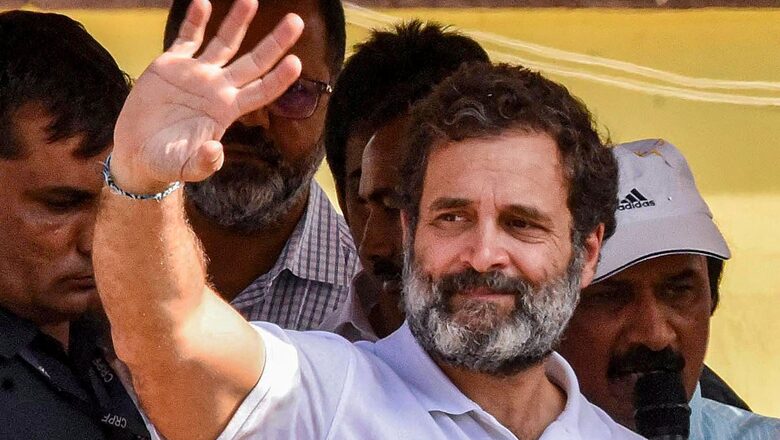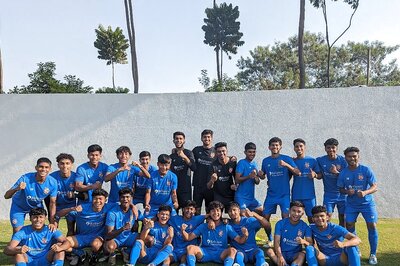
views
In the realm of Indian politics, a recent proclamation by Uttar Pradesh Congress chief, Ajay Rai, has ignited discussions and raised pertinent questions about the upcoming electoral landscape. The announcement stated that the former party president and Member of Parliament, Rahul Gandhi, is set to re-enter the fray from the emblematic Amethi constituency.
This revelation unfolds against the backdrop of a nascent alliance named ‘INDIA,’ which is a collaborative endeavour between various Opposition parties. However, it emerges at a juncture when the contours of seat-sharing agreements and state-specific strategies within the Opposition bloc remain uncharted territories. The timing of these sweeping announcements is now under scrutiny, sparking a debate on their sagacity within the political discourse.
Alliance Vs Ambition
Crucially, the essence of the matter extends beyond the individual choices of candidatures; it encompasses the broader implications for the strategic cohesion of the newly formed INDIA alliance. As the Congress party contemplates centring the election narrative around Rahul Gandhi’s candidature from Amethi and the potential candidature of Priyanka Gandhi from Varanasi—Prime Minister Narendra Modi’s stronghold—it raises a critical question about the proportionality of this focus within the larger ambit of the Opposition’s objectives. While it is undeniable that individual charisma and lineage bear significance in politics, overly fixating on these personalities could inadvertently detract from the overarching goals of the INDIA bloc. A skewed emphasis on a couple of constituencies could lead to a scenario where the party’s attention becomes unduly concentrated, sidelining other crucial constituencies and diluting the broader narrative.
The core principle that emerges from this scenario is the need for a balanced approach that harmonises individual ambitions with collective aspirations. It is imperative that the Congress party, as a key component of the alliance, recognise the importance of synchronised decision-making. When forging a collaborative front, it becomes indispensable for all participating parties to engage in shared deliberations before making substantial announcements. A parallel track of unilateral declarations could potentially erode the unity that is vital for the alliance’s effectiveness.
Amethi is an ego battle, not a strategy
A deeper historical perspective offers insights into the significance of Amethi within the Congress party’s narrative. Analogous to Rai Bareli, Amethi has entrenched itself as a bastion of the Congress—a legacy synonymous with the Gandhi family. The trajectory began in 1980 with Sanjay Gandhi’s representation of the Amethi Lok Sabha constituency. Following his untimely demise, the mantle was passed to his brother, Rajiv Gandhi, a former Prime Minister of India, who secured consecutive victories in 1984, 1989 and 1991. Subsequently, Sonia Gandhi, the then Congress president, emerged victorious from this constituency in the 1999 Lok Sabha elections. The baton was then taken up by Rahul Gandhi, who maintained the family’s legacy by triumphing in Amethi between 2004 and 2014.
However, the political landscape underwent a seismic shift during the 2019 Lok Sabha elections when BJP leader Smriti Irani dethroned Gandhi to claim Amethi. Notably, Irani had previously contested the seat in 2014, losing to Gandhi by a substantial margin of over 1.5 lakh votes. Her electoral fortunes reversed in 2019, as she managed to secure victory with a narrower margin of around 55,000 votes.
The 2019 elections marked a historic shift, representing the first instance where a member of the Gandhi family was unseated in the Amethi Lok Sabha constituency. This transformation was swiftly capitalised upon by the BJP, which leveraged the event to level criticism against the Congress. Irani, now a prominent figure in the political landscape, emerged as one of Rahul Gandhi’s vocal adversaries, actively challenging him both within the parliamentary chambers and outside. The contest for Amethi thus metamorphosed into an arena of ego-driven rivalries, particularly for Rahul Gandhi.
However, in the broader context of coalition politics, the fundamental paradigm demands a departure from ego-centric battles. Instead, the focal point should be the formulation of comprehensive ground-level strategies that resonate with the aspirations of the diverse constituencies involved. The nascent INDIA alliance must eschew succumbing to the gravitational pull of individualistic aspirations. It is incumbent upon the Congress to recognise that the path to a successful alliance lies in embracing shared goals and coordinated strategies.
In summation, the decision to field Rahul Gandhi from Amethi and the resonance of Amethi within Congress’s political psyche underscore the intricate interplay of personal aspirations and collective strategies. As the INDIA alliance takes shape, the imperative is to balance the charisma of individual candidates with a broader narrative that encapsulates the aspirations of the electorate. While Amethi’s historical significance is undeniable, its transformation from an ego-centric battleground to a strategic asset hinges on the ability of the Congress and the alliance partners to navigate this delicate equilibrium. In this transformative phase of Indian politics, the mantra is clear: collective vision over individual egos.
Not good news for the opposition
The Opposition coalition is still in the process of finalising several crucial aspects, which include determining the seat-sharing arrangement and formulating state-specific strategies. An intriguing scenario emerges if Rahul Gandhi chooses to contest from Amethi and Priyanka Gandhi from Varanasi. This decision would necessitate the Congress party’s undivided attention on these two constituencies.
Although the recent dynamics seem to indicate a swift decline in the Bharatiya Janata Party’s influence, it is essential for the Opposition to broaden its focus across the entirety of India rather than getting fixated on specific electoral battlegrounds. The risk of hyper-focusing on particular seats, particularly in the face of formidable opponents, demands a strategic reconsideration from the Opposition political parties.
An inherent concern arises if Rahul Gandhi opts for Amethi, potentially constraining his capacity to campaign extensively for the Opposition alliance. This might limit his mobility to the state of Uttar Pradesh, effectively sidelining other crucial electoral battlegrounds. Furthermore, the Congress’s decision to field candidates in such a manner can inadvertently furnish the BJP with potent ammunition to fuel their narrative against not only the Opposition alliance but also the Congress itself. The BJP could amplify its stance against dynastic politics, portraying it as a quintessential facet of the Opposition’s agenda. This argument would gain traction if Rahul Gandhi contests Amethi, as it could be construed as a preference for personal interests over broader public service objectives. This very narrative was instrumental when Gandhi sought reprieve from the Supreme Court in the Modi surname defamation case, a move that led to his disqualification as a Member of Parliament.
Furthermore, such a scenario could potentially trigger a reiteration of the 2024 election narrative: the Gandhi family versus Prime Minister Narendra Modi. However, historical trends underscore that this narrative hasn’t borne significant fruit in past Lok Sabha elections. It becomes evident that this formula doesn’t resonate effectively with the electorate, emphasising the importance of the Opposition steering their discourse towards more tangible and pressing issues that resonate with the common people. To achieve success, INDIA must steer clear of an overemphasis on personal ambitions, particularly those tied to the Gandhi family.
It’s pertinent to acknowledge that the Opposition coalition is already grappling with an array of pressing issues. Within this alliance, the Aam Aadmi Party (AAP) and the Congress have been embroiled in exchanges, reflecting underlying tensions. Furthermore, the dynamics between Mamata Banerjee, the Congress, and the Left remain largely unchanged in Bengal. Notably, in the political landscape of Uttar Pradesh, the Samajwadi Party (SP) is signalling a diminished tolerance for the dominance of the Gandhi family, especially given the Congress’s precarious political standing within the state. It is not hidden why Congress wants Rahul Gandhi and Priyanka Gandhi in such crucial seats. It’s the hunger for power.
In summation, the ongoing discourse around the Opposition’s electoral strategies reveals the intricate balance between personal aspirations and collective objectives. While the prospect of Rahul Gandhi contesting from Amethi and Priyanka Gandhi from Varanasi carries its own intrigue, the Opposition’s capacity to succeed hinges on their ability to transcend individual ambitions and focus on broader, more pertinent issues. A deeper examination reveals that the Opposition’s potential rests in its ability to construct a narrative that resonates deeply with the diverse populace of the nation, steering away from overwrought narratives that have proven ineffective in the past.
The author is a visiting professor of journalism, a political columnist, and a doctoral research scholar. He tweets at @sayantan_gh. Views expressed in the above piece are personal and solely that of the author. They do not necessarily reflect News18’s views.




















Comments
0 comment